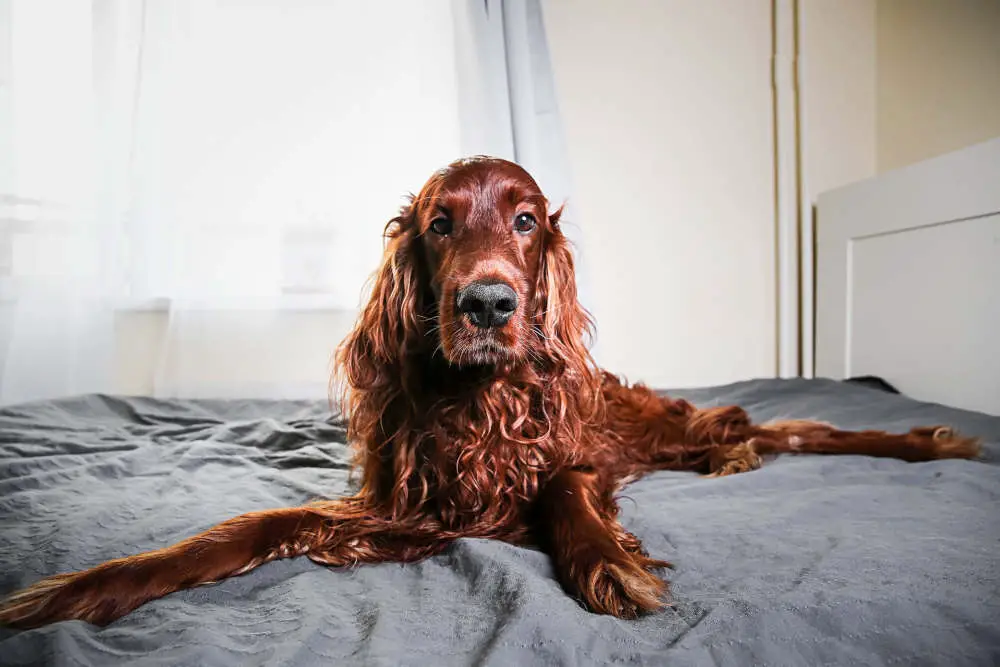
Many dog owners have experienced the unpleasant surprise of finding their furry friend has peed on their bed. While it can be frustrating and confusing, there are several reasons why dogs may exhibit this behavior.
One common reason for dogs peeing on beds is medical issues. Urinary tract infections, kidney problems, and incontinence can all cause dogs to have accidents on the bed. It’s important to rule out any underlying health issues before addressing potential behavioral problems.
However, dogs may also pee on the bed due to emotional or behavioral issues. Anxiety, poor housetraining, separation anxiety, and urine marking are all potential reasons why a dog may exhibit this behavior. Understanding the root cause of the behavior can help owners take the appropriate steps to prevent future accidents.
Possible Medical Reasons
Before assuming that your dog’s bed peeing is behavioral, it is important to have your dog checked out by a veterinarian to rule out any medical problems. Some medical conditions in dogs that can cause peeing on things inside the house include:
Urinary Tract Infection
A urinary tract infection (UTI) can cause a dog to have urinary accidents. UTIs are more common in female dogs but can occur in males as well. Symptoms of a UTI include frequent urination, straining to urinate, and blood in the urine. Your vet may need a urine sample to run a urinalysis to diagnose a UTI. Antibiotics are usually prescribed to treat a UTI.
Incontinence
Incontinence is the inability to control urination. It can be caused by weak bladder muscles, hormonal imbalances, or nerve damage. Incontinence is more common in older dogs and spayed females. Symptoms of incontinence include dribbling urine while sleeping, leaking urine while walking, and wetting the bed. Your vet may prescribe medication to help control incontinence.
Bladder Stones
Bladder stones are hard mineral deposits that form in the bladder. They can cause pain and discomfort and may lead to urinary accidents. Symptoms of bladder stones include frequent urination, straining to urinate, and blood in the urine. Your vet may need to perform an ultrasound or X-ray to diagnose bladder stones. Treatment may involve surgery or a special diet to dissolve the stones.
Also Read: Help! How Do I Stop My Dog From Peeing On The Couch?
Behavioral Reasons
There are several behavioral reasons why dogs may pee on their owner’s bed. These reasons can range from anxiety or stress to territorial marking to a lack of proper training. Understanding these reasons can help pet owners address the issue and prevent it from happening in the future.
Anxiety or Stress
One common reason why dogs may pee on their owner’s bed is due to anxiety or stress. Dogs who suffer from separation anxiety may feel distressed when left alone and may have accidents in the house, including on the bed. Other sources of stress, such as loud noises or changes in routine, can also cause a dog to feel anxious and lead to peeing on the bed.
Territorial Marking
Dogs are territorial animals, and they may mark their territory by urinating on objects in their environment. This behavior is especially common in male dogs who have not been neutered. Marking behavior can also occur in female dogs and neutered males, however, and may be triggered by the presence of new people or animals in the home.
Lack of Proper Training
In some cases, dogs may pee on the bed simply because they have not been properly trained to go outside. This can occur in puppies who are still learning how to control their bladders or in older dogs who have not been consistently trained to go outside. In these cases, it is important to reinforce positive behaviors and provide consistent training to encourage proper bathroom habits.
Environmental Factors
Environmental factors can also play a role in why a dog may pee on their owner’s bed. These factors can include:
Lack of Access to Outdoors
One possible reason why a dog may pee on their owner’s bed is because they do not have access to the outdoors when they need to relieve themselves. This can happen if the owner is away from home for extended periods of time or if the dog is not properly trained to signal when they need to go outside. It is important to establish a consistent routine for taking the dog outside and to make sure they have access to the outdoors when needed.
Dirty or Uncomfortable Bedding
If a dog’s bedding is dirty or uncomfortable, they may choose to relieve themselves elsewhere, such as on their owner’s bed. It is important to regularly clean and replace the dog’s bedding to ensure it is comfortable and hygienic. Additionally, some dogs may prefer certain types of bedding, such as soft blankets or pillows, so it may be helpful to experiment with different types of bedding to see what the dog prefers.
Changes in Household Routine
If there have been recent changes in the household routine, such as a new family member or a change in work schedule, this can cause stress and anxiety for the dog. This stress may manifest as inappropriate urination, including on the owner’s bed. To help alleviate this stress, it is important to establish a consistent routine for the dog and to provide plenty of positive reinforcement and attention.
Also Read: Why Has My Dog Started Pooping In The House At Night?
Prevention and Treatment
Addressing Anxiety and Stress
To help dogs cope with anxiety or stress, consider using calming aids like pheromone diffusers, creating a safe and comfortable space for the dog, and seeking the assistance of a professional dog behaviorist or trainer to address anxiety-related issues.
Neutering/Spaying
Neutering or spaying your dog may help reduce marking behavior, as well as provide other health and behavioral benefits. Discuss the pros and cons of these procedures with your veterinarian to determine if they are suitable for your dog.
Crate Training
Consider crate training as an additional option to prevent accidents and teach dogs to hold their bladder until they are taken outside. Proper crate training can provide a safe space for your dog and help them develop better bladder control.
Consulting a Veterinarian
If your dog is suddenly peeing on your bed, it is important to rule out any medical issues that may be causing the behavior. Urinary tract infections, kidney problems, and bladder stones can all cause urinary accidents. A veterinarian can run tests to determine if there is an underlying medical issue that needs to be addressed.
Establishing a Routine
Dogs thrive on routine, and establishing a consistent schedule for feeding, exercise, and potty breaks can help prevent accidents. Make sure to take your dog outside to pee before bedtime, and limit water intake in the evening to reduce the likelihood of accidents.
Positive Reinforcement Training
Positive reinforcement training can be an effective way to train your dog not to pee on your bed. When your dog pees outside, reward them with treats and praise. If your dog tries to pee on the bed, interrupt the behavior with a loud noise or clap, and immediately take them outside to finish peeing. Reward them when they finish peeing outside.
It is important to never punish your dog for accidents, as this can lead to fear and anxiety, which can worsen the behavior. Instead, focus on positive reinforcement and consistency to help your dog learn the appropriate behavior. With patience and dedication, you can train your dog not to pee on your bed.
Also Read: Why Does My Dog Pee On Other Dogs?
Final Thoughts
Dogs peeing on beds can be a result of various factors, including medical issues, behavioral problems, and environmental factors. To address this issue, it’s crucial to consult a veterinarian to rule out medical concerns, establish a consistent routine, and use positive reinforcement training.
By understanding the root cause of the behavior and taking appropriate steps, dog owners can prevent future accidents and enjoy a clean and comfortable bed. Remember, patience and dedication are key in helping your dog learn the appropriate behavior.

